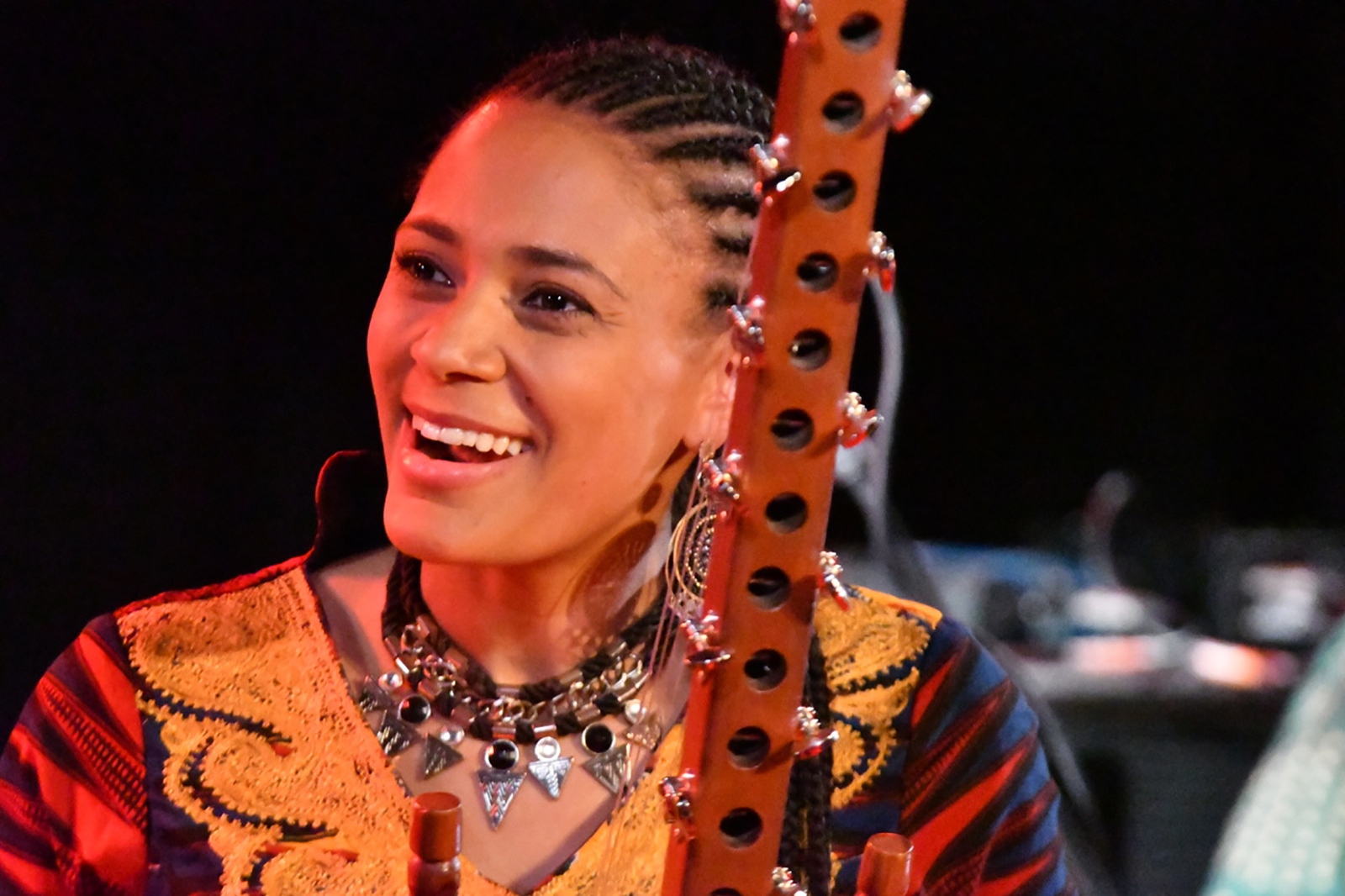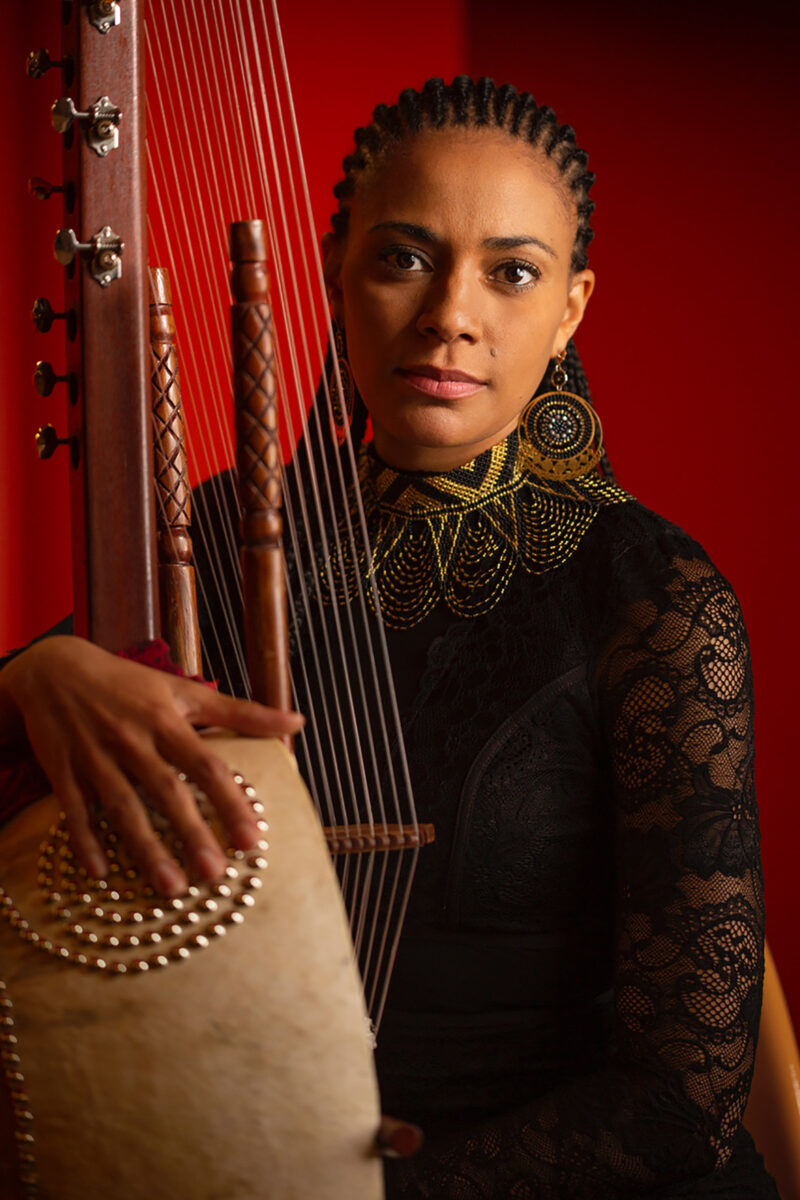With Kalispell Show, Sona Jobarteh Looks to Continue the Kora’s Musical Transcendence
The kora is a 21-string instrument that originates in West Africa, and has been compared to the harp, lute and guitar.
By Mike Kordenbrock
The kora may not be an instrument that Flathead Valley music fans have heard of, but one if its most famous players, Sona Jobarteh, has seen the way audiences across continents, and cultures, react favorably — sometimes with a degree of surprise and confusion at how easily they relate to its sound.
The kora is approximately 5 feet in length and utilizes a half calabash gourd wrapped in hide as the vessel from which sound resonates. Jutting from the flattened surface of the calabash is a bridge post, across which 21 strings stretch taut from the kora’s base on their way to destinations along the instrument’s neck. It’s a kind of harp, with a cascading sound that has also drawn comparisons to the guitar and lute, and it is played with the thumb and index fingers of each hand, which are positioned on either side of the instrument’s midpoint. Some scholars believe the kora has its roots in 18th century West Africa, although similar instruments from the region that may have preceded it are even older, and some players believe its history goes back to the 13thcentury.

Jobarteh, who is playing in Kalispell at Flathead Valley Community College’s Wachholz College Center on April 17, said that in a certain way the kora reminds her of the guitar, given its ability to transcend the limits of familiarity and culture, and even language, considering that Jobarteh sings in Mandinka, which is an ethnic language spoken in parts of West Africa.
“I mean, wherever you take the guitar in the world it has the ability to be able to relate and adapt to people of those different areas. And it can play in so many different genres and settings. And I think the kora has some of that capability,” Jobarteh said during a recent interview with the Beacon.
Jobarteh divided her childhood between Great Britain, where she was born and where her mother is from, and Gambia, where her father is from. She is considered a griot, which is a type of traditional performer and community leader that come from certain families. In a 2021 profile of Jobarteh, the New York Times described a griot as a musician or poet who fills a broader role in West African culture, including by playing the kora, and being knowledgeable about culture, history, genealogy, mediation, and teaching.
“The griot is someone who is a pillar of society, who people go to for guidance, for advice, for wisdom,” Jobarteh told the Times.
Jobarteh’s position as a griot is distinguished in part for her role in breaking from traditional gender roles by becoming an expert in the kora, whose master players before Jobarteh were exclusively male, with instruction in playing the instrument traditionally passed down from father to son. Her musical education included composition lessons, and instruction in the cello, harpsichord and piano, before learning the kora from her father. Her level of skill is such that she is considered a virtuoso kora player.
Despite a musical life that has brought exposure to so many other instruments, Jobarteh said that her connection with the kora is such that she considers it a central part of her “musical existence.”
“And I think it always will be. Me going out on the stage without the kora, is kind of like not me, if that makes sense,” Jobarteh said.
The instrument has a reputation for being difficult to learn, and in a 2022 “60 Minutes” feature, Jobarteh joked to the journalist Lesley Stahl that her grandfather used to say of learning the kora that “you will die a learner.”
In addition to her work as a musician and touring performer, Jobarteh founded The Gambia Academy in 2015, a school which offers instruction in core academic subjects while also offering instruction in music, dance, martial arts, agriculture and poultry raising. The academy is in the midst of designing a new curriculum, which will be launching next fall, and Jobarteh said she’s also designing a course for next fall at the Berklee College of Music in Boston. All of this, combined with the demands of her touring schedule, means for the time being, that she isn’t creating new music right now. She said that she hopes next year, to dial things back a bit.
Jobarteh’s recent interview with the Beacon took place while on the road with her band, which includes a bass player, guitarist, percussionist and drummer from four different countries, and Jobarteh herself sometimes picks up a guitar depending on the song. They typically play over 100 shows in a year, or as she put it, roughly a show every three days. Her April 17 show in Kalispell, will be followed by a show in Butte and a show in Hamilton, before her tour heads off to London.
The international nature of her audience, and Jobarteh’s familiarity with just how differently one group of people may engage with her music, or express their engagement, means that she adapts her performances as they happen, rather than showing up with a set list written in stone. She sees a performance as a two-way street, in which she is both giving something to the audience, but also receiving something in return.
“It’s like personalities, I would say. Even if you enter into a conversation with somebody, you know, different strangers, some people make that conversation very easy and others you have to work a little bit harder to get them to that space,” Jobarteh said. “Sometimes it’s tiring, sometimes it’s the opposite, it feels like it’s giving you energy, it really just depends on the different types of audiences I come in contact with.”
Generally, though, the instrument’s ability to bring people in, has proven to be consistent, Jobarteh said. It’s a feature of the kora that she finds to be powerful, not only for what the instrument can achieve, but for what that achievement seems to imply.
“I think it’s a beautiful thing to be able to present that to audiences, and allow them to have that moment of feeling, that ‘Oh wow, we get it. We relate to it. We can understand it. We don’t understand a single word you’re singing, but we can connect to this,” Jobarteh said.
“And I think that’s a great feeling, of maybe bringing about a sense of universality of that language of music.”
Sona Jobarteh will perform at Flathead Valley Community College’s Wachholz College Center on April 17 at 7:30 p.m. For more information, including to purchase tickets, go to https://www.wachholzcollegecenter.org/Online/default.asp.